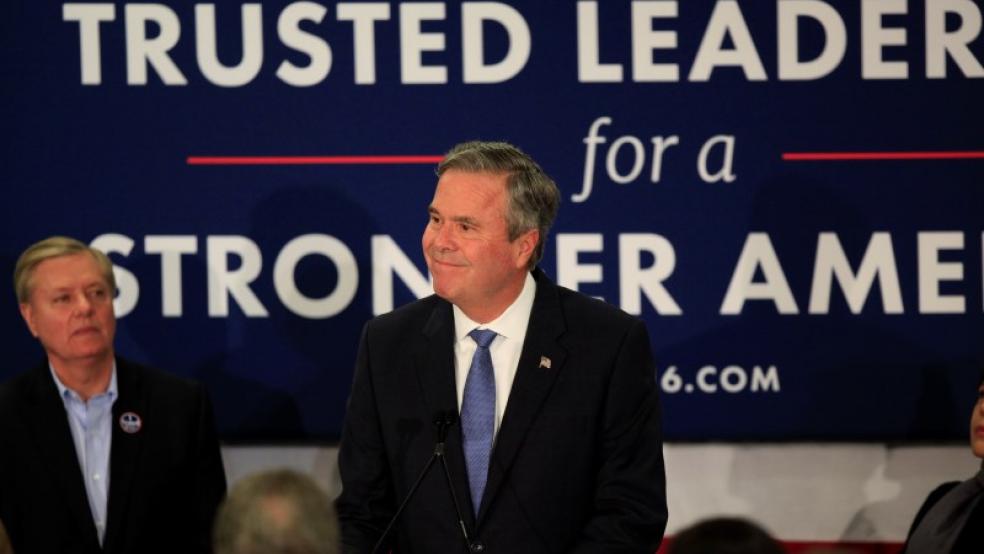A year ago, Jeb Bush's allies told reporters that they were preparing a "shock and awe" fundraising campaign in which they would amass such an intimidating pile of cash that other candidates might just leave the race lest they be crushed by Bush's gargantuan war machine made of money. True to their word, Team Jeb met its ambitious target of $100 million, then began to deploy it to sweep Bush's opponents aside on his path straight to the White House.
But as you might have noticed, something went awry with the plan. As The Washington Post reported this week, Bush's super PAC Right to Rise has spent $50 million, which has brought Jeb from his peak suppport of 15 percent earlier in the year to around 5 percent now, putting him in fifth place behind a reality TV demagogue, a doctor with zero political experience, and a couple of pipsqueak senators.
Related: Trump to Cruz: Nobody Likes You\
Does this tell us that money no longer matters in politics, and despite all those billionaires opening up their checkbooks for the politicians who seek their favor, there really isn't anything to worry about? Not exactly.
Both parties have stories they tell about the campaign finance system, neither one of which is completely accurate. Democrats say that people like the Koch brothers and Sheldon Adelson can just buy elections, using their unlimited funds to install whichever puppet they want in public office. But as Bush's experience shows, money is necessary but not sufficient for political success. Cases where a rich guy just buys himself an election are rare (though they do happen from time to time). And in the context of a presidential campaign, there are enough billionaires backing enough candidates that no one fat cat can decide who wins.
Furthermore, the interests of the wealthy and corporations have been woven so tightly into Republican ideology that no one needs to convince GOP politicians to do the plutocrats' bidding. That's what they already want to do, deep in their hearts. That doesn't mean that the candidates won't crawl on their knees to those donors, and listen to their sage advice on policy matters (speaking of which, congrats to Marco Rubio on nabbing the "endorsement" of the richest man in Illinois!). But on the Republican side anyway, they aren't strong arming the politicians into doing what they weren't already inclined to do.
Nevertheless, the Democratic story gets at a fundamental truth: The system is set up so that the people politicians listen to most intently are the ones with the most money, and when they give, they expect friendly policy in return. The quid pro quos are subtle and usually unspoken, but that doesn't mean they don't exist.
Related: Here’s Why Ted Cruz Could Win the GOP Nomination
The Republicans, on the other hand, tell a story about campaign finance that not even they can truly believe. Their story is that patriotic donors give money not to influence policy at all, but merely as an expressive act, the truest and most inspiring example of the First Amendment in action. And the more money there is in politics, the better it is for everyone. Which is why Mitch McConnell, the most passionate enemy of campaign finance regulation to have ever walked Washington's gold-lined avenues, is pushing to eradicate the last vestige of limits on what the well-heeled can drop into campaigns. His latest proposal is to eliminate the limits on what the parties can spend coordinating directly with candidates, smoothing yet another pathway for big money to get right to candidates.
The current joke of a campaign finance regime, where we pretend there's some meaningful difference between someone giving a million dollars directly to a candidate and giving the same sum to his super PAC, and where Republicans appoint commissioners to the Federal Election Commission who believe there should be no regulation at all, successfully crippling the agency, is largely of McConnell's making. Just a few more tweaks, and it will fulfill the Republicans' vision of leaving no impediments in billionaires' way when they want to bestow their boundless largesse upon our nation's lawmakers.
But does that matter, if it's so hard to buy an election? The answer is that it does, even if Jeb Bush's donors won't be getting anything for their money. As long as they need money to stay competitive — even if it can't guarantee victory — politicians will continue to beat a path to the doors of the wealthy. And the more time they spend talking and listening to those with the bulging bank accounts, the more the politicians will adopt the wealthy's concerns as their own. Even if they're already favorably inclined toward tax cuts and fewer regulations, the devil is in the details of which tax cuts and which regulations.
And there's a kind of mutual consent that creates its own reality. The donors like to believe they can shape elections, so they want to give, and expect the politicians to be there for them when they do. The politicians believe that they're nowhere without big money, so they keep asking for it and remember how they might aid those donors who have made their campaigns possible.
It's not the old-fashioned, envelope-full-of-cash-in-exchange-for-your-vote kind of corruption. But it's still a long way from democracy.
This article originally appeared on The Week. Read more from The Week:




